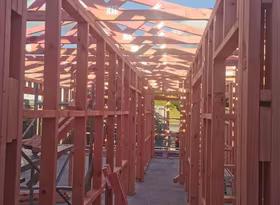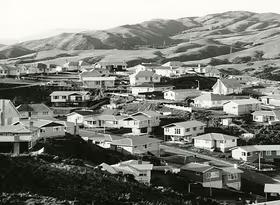Housing and the accidental xenophobe
Today I’m going to take a brief break from the tax articles I’ve been writing to comment on the rising complaints about foreign buyers of New Zealand homes. Usually I’d ignore this type of bleating as typical xenophobic outrage, but with the issue increasingly being pushed into the area of economic debate I simply feel it needs to be discussed.
Economists like to discuss trade-off, and in this case there appears to be a perception that there is a trade-off between the welfare of people overseas and people here – when there is not. In the end, the calls for policy intervention are starting to sound more like xenophobia, taking us on a slippery slope of blaming non-residents for anything we perceive to be unfair or wrong in our own lives.
Now don’t get me wrong, the vast majority of commentators saying these things in New Zealand are not intentionally xenophobic – they are generally kind hearted and intelligent people who just want to solve a perceived problem. However, anyone pushing bans of the sale of property to non-residents just doesn’t understand what the ‘problem’ is and as a result is unintentionally following actions that go down a xenophobic path.
But I digress, you don’t read this to hear some strange looking man in a waistcoat rant about what he thinks is right and wrong – you want a simple economic run-down. I will aim to provide that here.
Thinking about trade-offs
It is impossible to make any sense of a policy without asking why we want to do it. Saying “house prices are going up” doesn’t have much to do with anything, we need to ask what the underlying policy issue is and how a ban on house sales to non-residents would interact with that.
So what is going on that has led people to believe we need to ban the sale of houses to foreign residents? The two clearest issues that people have about the housing market are concerns about a housing bubble and concerns about the affordability of housing given that it is a necessity.
These are both reasonable concerns – but as we will discuss below, banning sales to non-residents don’t actually deal with the situation and is likely to hurt the vast majority of people involved.
Foreign buyers, bubbles and the New Zealand housing market
The most obvious concern appears to be around a housing bubble stemming solely from people who live overseas boosting demand for New Zealand property – property they do not intend to live in.
The argument is that foreign owners coming into the market push house prices out of line with fundamentals. We have touched on the issue previously, and come to the conclusion that this may actually have a lot of benefits for New Zealanders. As a result, banning sales in this context has similarities to cutting off your nose to spite your face!
Let me discuss this issue a little more. To start off, let us assume the perfect situation for the people making this argument. We will assume that somehow we can identify the investors from overseas who are going to buy houses and not live in them – so we are not just arbitrarily punishing immigrants. This is a strong assumption, which is false – in reality introducing these policies does involve arbitrarily hurting immigrants as well.
In this ideal situation we will also magically assume that there is a bubble due solely to overseas investors (again another very strong assumption). With this we are saying that people from overseas are willing to overpay for an asset relative to its fundamental value. They will give the previous New Zealand owner more capital than they previously could have sold the house for. In this context, the “housing bubble due to foreigners” is actually “people overseas giving New Zealanders wealth” – wealth that can be used to pay for goods and services from overseas.
Now many people are concerned about bubbles because they are worried New Zealander’s will take on too much debt or that it will make the financial system fragile. But this example involves people overseas just giving New Zealanders wealth – it is not clear that this would increase fragility and by providing liquid wealth it gives households the capital to actually pay down debt!
Furthermore, as long as banks are being pushed to hold sufficient capital a short-term bubble doesn’t matter – people currently overpaying will hurt themselves to the benefit of those who just sold.
If the bubble was to last a bit longer, this would lead to “too many” houses being built – which in turn would push down rents for people living in New Zealand. This point becomes more important if we are to think about affordability instead.
Affordability: Confusing the desire for a free lunch with reality
Unlike our assumed bubble which is due to a temporary surge in demand from overseas, an underlying affordability issue relies on what happens in the longer-term.
Housing affordability is a touch stone issue for many people – and in the current context the main affordability concerns are in Auckland. Essentially people want:
- A certain size and quality of house
- A house to always cost less than a certain amount
- An obsession with being an “owner”
However, property has become more “scarce” and so this implies that people in Auckland either have to pay a higher price for it or accept a smaller backyard and/or dwelling.
So what makes property more scarce? Well everyone talks about land use constraints which limit what can be built and where. No doubt this has an effect. However, population growth also has an effect given these constraints, and the increasing returns from alternate uses of the land also boost prices. These are the main drivers of prices being higher.
However, we are here to only look at our foreign investor. The investor that doesn’t actually live in the house won’t boost the cost of renting (in fact, by increasing the supply it will lower the rental cost), but having open capital markets means that foreign demand will make purchasing the house more expensive.
But, it also means that the house can be sold for more in the future as well! When we actually think about affordability, we should be thinking about the implied rental cost associated with the house.
The implied rental cost depends inherently on the supply of property – hence why we hear so many economists, such as myself, whining about issues of supply when discussing the housing market.
The real issue of concern?
Some may say that a bubble right now makes house prices expensive right now, thereby reducing affordability right now. However, why do we care if someone cannot afford to buy a house at this very second – couldn’t they just wait till the bubble is over?
However the concern here is that, New Zealanders that go out to buy a house during this bubble end up facing all the risk and expected drop in house prices associated with the bubble. Generally these people are young New Zealanders who intend to start a family, and as a society we feel a bit rough about the fact they are in that position. I know that when I read Bernard Hickey write for example, I get the impression that this is the underlying issue that is really concerning him.
This distribution issue does matter. If it is something society, and individuals, care about as a matter of fairness it is relevant. But, banning foreign ownership and throwing away all the wealth gains associated with foreign residents overpaying is not a solution.
Instead, we need to be honest about the transfer that may exist between current older homeowners and the young, and think about how the tax and transfer system can be made to deal with this. Admit the perceived unfair transfer that is taking place within society and deal with it directly!
New Zealander’s accidental xenophobia
I have no doubt that many people pushing for these policies merely haven’t looked into these issues or are unwilling to stick to this description. Saying “it increases demand” and “prices go up” isn’t an analysis of the impact on peoples lives – we need to ask overseas what the higher demand from overseas means, and look through the trade-offs in terms of what a bubble and affordability are as we have briefly above.
Ultimately people are trying to find a solution for some of the genuine pain they see around them in society – this aim is noble. Generally, many of the people arguing for sales bans are good people who believe they are pushing for things that will help everyone.
But when we come to policy, intention is a load of rubbish – the road to hell is paved with good intentions. If we genuinely care we need to actually think about the people that are hurt as well as those who win by the policies that are put in place. An unwillingness to critically assess bans on foreign owners of property doesn’t stop the policy, and those pushing for it, being directly xenophobic.
If as a society we want to help the poor and promote opportunity (I certainly hope we do), then let us focus on the ways the tax and transfer system works to help achieve that. If we notice that the Auckland housing market appears to be dysfunctional, let us deal with the issues of the quantity and composition of property in the region (supply) rather than messing around the edges to prevent voluntary trade between New Zealanders and people overseas.
An unwillingness to think through policy issues and then quickly blame foreigners is not acceptable. This vein of writing that is becoming prevalent in New Zealand is something that I totally and unconditionally disagree with.














